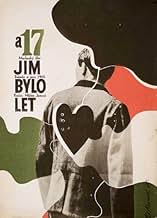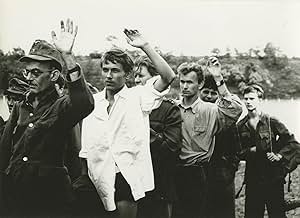In the final days of WWII, a seventeen-year-old boy wanders the countryside. He is captured by Soviet troops, then released, then captured once more - after he has donned a German uniform fo... Read allIn the final days of WWII, a seventeen-year-old boy wanders the countryside. He is captured by Soviet troops, then released, then captured once more - after he has donned a German uniform for warmth - and imprisoned at a remote barracks, where he strikes up an unlikely friendship... Read allIn the final days of WWII, a seventeen-year-old boy wanders the countryside. He is captured by Soviet troops, then released, then captured once more - after he has donned a German uniform for warmth - and imprisoned at a remote barracks, where he strikes up an unlikely friendship with a young Russian soldier. His attempts to return home form the crux of this wonderful... Read all
- Director
- Writers
- All cast & crew
- Production, box office & more at IMDbPro
Featured reviews
Eventually the film becomes a vivid and psychologically telling depiction of male friendship. In 1967 a story of friendship between a Russian and a hungarian after WW2 is an incredibly political subject,yet Jansco affects a kind of delightful innocence in this section and never lets his symbolism overwhelm his characters. What could have been over-reaching and didactic emerges as more of a chamber piece. I don't know how Jansco ever got away with making these kinds of movies in a soviet country.
My only caveat is that Jansco's most significant theme, political violence and its random nature, is partly explored in this film but in a way completely superficial and unaffecting compared to the terrible catharsis of films like "The round up" and "the red and the white".
Overall, a gem
Jancso seems more advanced in retrospect.
Most of his films from this period are about war, they are fine as such, better than most anything by anyone else; and war (usually WWII) did after all loom large in the consciousness of people who lived through it as impressionable youngsters, so it was a much more personal experience than it is for us now, distantly desensitized to it by TV footage of war coverage and atrocity. And they are so purely about war, it seems a lot of viewers have rested upon watching his films on a certain abstraction of war.
But let's see something else. Nevermind war for a moment. We can know it is WWII somewhere in Hungary, but there are no battles, no two armies on opposite sides to clearly define conflict. We know as much about it as we do about the protagonist, nothing beyond that he's a boy of 17 tossed by forces beyond understanding. There is no broader story to define who he is versus what he is up against, nothing beyond the fact that there he is, strange people arrest him, he breaks free, is arrested again, and there's the vague hum of violence hanging over the prairie.
It is all so clear when you see through Jancso's eyes, no clutter here.
Where most filmmakers try to get the whole image, he lightly sketches edges only—the air around the thing.
Here, the image is of the boy rushing from one stage of life to the next, always moved because the gears of the world move. Others pass through the outpost, soldiers, civilians, wary, bored, some of them small-minded fools doing what they were told to do. Always with the violence, because who knows what part of what story those people live in.
The first half of this is sublime, there is no story (later there will be some), only glimpses from transient life as the boy's taken around, what the Japanese had a century before perfected in their art of woodblock carving. Buddhist-inspired in its original context, the images reinforced a worldview of fleeting sorrows, impermanence, sweet reminder of the emptiness of all things.
So it is with Jancso, who (unlike most filmmakers of war) does not dwell on suffering, presents atrocity as fleeting as everything else. Whose camera is the Japanese floating eye, always gliding at arm's length (never fixed, theatric) as though self-less consciousness hovers in and off itself, broken up by bird's eye views of abstract landscape.
Want another clue? More purely about seeing, the boy has found in captivity binoculars that he uses to look at things, so far we thought he was in the middle of nowhere, but looking out with these things he observes (creates by seeing?) a quiet town, which suddenly, illusory, seems close enough. The association is with cinema, memory, remote vision.
The boys frolic in the ruins of ancient statues, forming temporary connections in a perishable world.
The film is the wonderful blueprint of this Buddhist world, of things coming to be and vanishing again.
I recommend this. Sure there is boredom and dead time, it can't be helped. Life has this asymmetry.
Something to meditate upon.
All of the films deal with the randomness of violence. War does not pick out people because they deserve to live or die. And authority is not tempered with justice. It is arbitrary. Even your own country men are a danger in this world.
The landscape, bare plains in all directions, as far as the eye can see captures the hopelessness of trying to escape. There is nowhere to hide. You are like a leaf caught in a wind that blows you one way or another. The point is made with a beautiful homage to North by Northwest (1959) when a plain chases the boys in the naked landscape, while they try to catch up with a naked woman, who is probably running away from rapists. It is telling that we never find out where she came from or what became of her. She is like one of those leaves being blown around by the winds of war.
So all these films capture the evil of war, and how inhuman and cold it is (no wonder Kubrick loved Miklós Jancsó). This film however does show us how the world could be. A friendship of a Hungarian and Russian boy is formed when the Russian boy saves the Hungarian one from a minefield. They take care of each other (even though they don't speak each other language) and form a friendship and love that is stronger than anything he receives from his own country men.
And let's us not forget that this film was made during the Cold War, when nations refused to see each other as human and threatened each other with weapons of mass destruction. Into that world comes this beautiful cry for peace, love and understanding.
Did you know
- TriviaMari Csomós's debut.
- ConnectionsFeatured in Film Review: International Films (1968)
Details
- Runtime1 hour 48 minutes
- Color
- Sound mix
- Aspect ratio
- 1.66 : 1
Contribute to this page


























